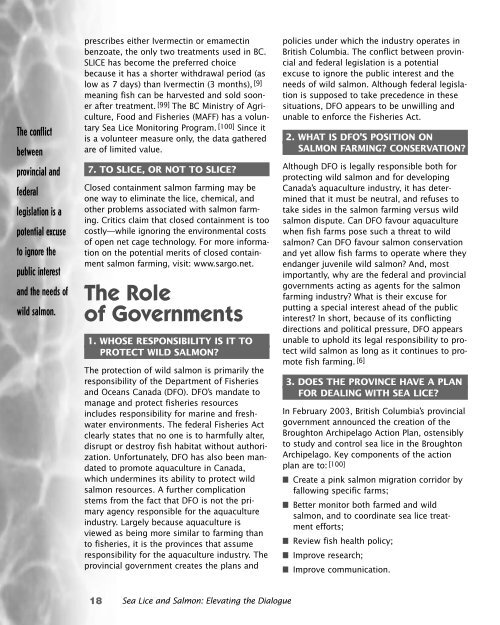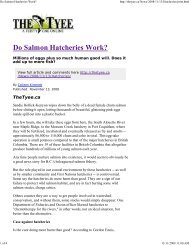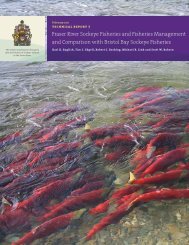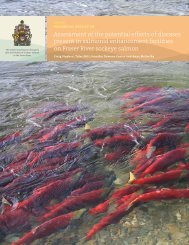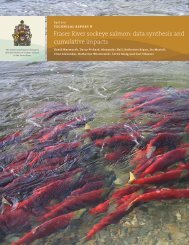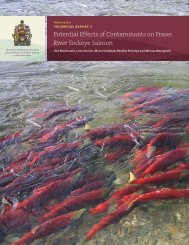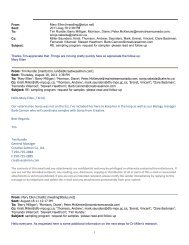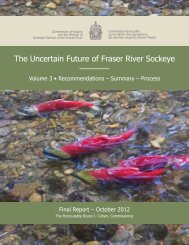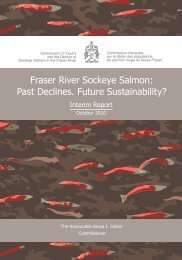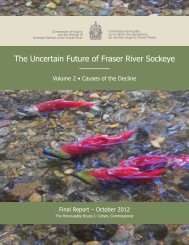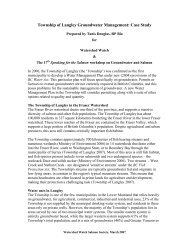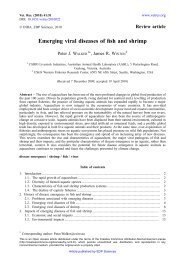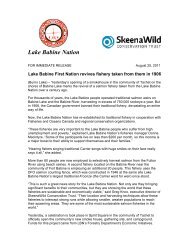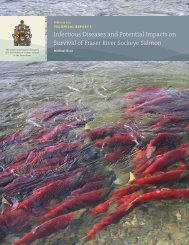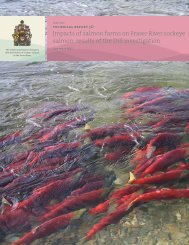Sea Lice AND Salmon - Farmed And Dangerous
Sea Lice AND Salmon - Farmed And Dangerous
Sea Lice AND Salmon - Farmed And Dangerous
Create successful ePaper yourself
Turn your PDF publications into a flip-book with our unique Google optimized e-Paper software.
The conflictbetweenprovincial andfederallegislation is apotential excuseto ignore thepublic interestand the needs ofwild salmon.prescribes either Ivermectin or emamectinbenzoate, the only two treatments used in BC.SLICE has become the preferred choicebecause it has a shorter withdrawal period (aslow as 7 days) than Ivermectin (3 months), [9]meaning fish can be harvested and sold soonerafter treatment. [99] The BC Ministry of Agriculture,Food and Fisheries (MAFF) has a voluntary<strong>Sea</strong> <strong>Lice</strong> Monitoring Program. [100] Since itis a volunteer measure only, the data gatheredare of limited value.7. TO SLICE, OR NOT TO SLICE?Closed containment salmon farming may beone way to eliminate the lice, chemical, andother problems associated with salmon farming.Critics claim that closed containment is toocostly—while ignoring the environmental costsof open net cage technology. For more informationon the potential merits of closed containmentsalmon farming, visit: www.sargo.net.The Roleof Governments1. WHOSE RESPONSIBILITY IS IT TOPROTECT WILD SALMON?The protection of wild salmon is primarily theresponsibility of the Department of Fisheriesand Oceans Canada (DFO). DFO’s mandate tomanage and protect fisheries resourcesincludes responsibility for marine and freshwaterenvironments. The federal Fisheries Actclearly states that no one is to harmfully alter,disrupt or destroy fish habitat without authorization.Unfortunately, DFO has also been mandatedto promote aquaculture in Canada,which undermines its ability to protect wildsalmon resources. A further complicationstems from the fact that DFO is not the primaryagency responsible for the aquacultureindustry. Largely because aquaculture isviewed as being more similar to farming thanto fisheries, it is the provinces that assumeresponsibility for the aquaculture industry. Theprovincial government creates the plans andpolicies under which the industry operates inBritish Columbia. The conflict between provincialand federal legislation is a potentialexcuse to ignore the public interest and theneeds of wild salmon. Although federal legislationis supposed to take precedence in thesesituations, DFO appears to be unwilling andunable to enforce the Fisheries Act.2. WHAT IS DFO’S POSITION ONSALMON FARMING? CONSERVATION?Although DFO is legally responsible both forprotecting wild salmon and for developingCanada’s aquaculture industry, it has determinedthat it must be neutral, and refuses totake sides in the salmon farming versus wildsalmon dispute. Can DFO favour aquaculturewhen fish farms pose such a threat to wildsalmon? Can DFO favour salmon conservationand yet allow fish farms to operate where theyendanger juvenile wild salmon? <strong>And</strong>, mostimportantly, why are the federal and provincialgovernments acting as agents for the salmonfarming industry? What is their excuse forputting a special interest ahead of the publicinterest? In short, because of its conflictingdirections and political pressure, DFO appearsunable to uphold its legal responsibility to protectwild salmon as long as it continues to promotefish farming. [6]3. DOES THE PROVINCE HAVE A PLANFOR DEALING WITH SEA LICE?In February 2003, British Columbia’s provincialgovernment announced the creation of theBroughton Archipelago Action Plan, ostensiblyto study and control sea lice in the BroughtonArchipelago. Key components of the actionplan are to: [100]■ Create a pink salmon migration corridor byfallowing specific farms;■ Better monitor both farmed and wildsalmon, and to coordinate sea lice treatmentefforts;■ Review fish health policy;■ Improve research;■ Improve communication.18 <strong>Sea</strong> <strong>Lice</strong> and <strong>Salmon</strong>: Elevating the Dialogue


